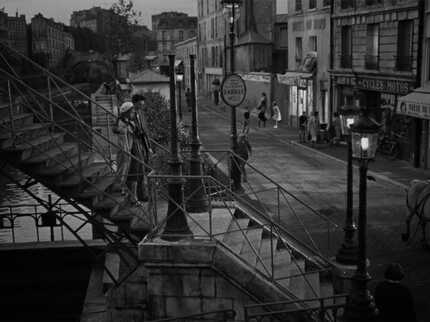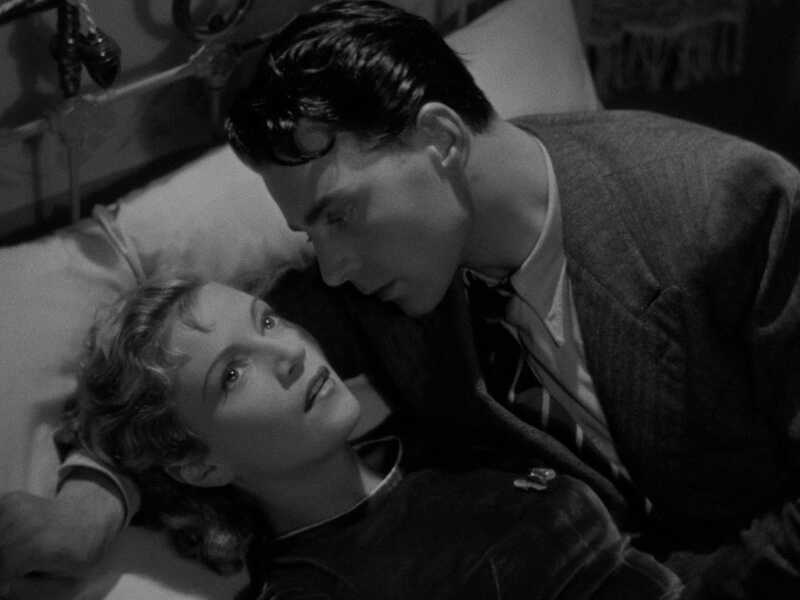Blu-ray Review: HOTEL DU NORD, Criterion Takes a Poetic Stroll Through Carné's Paris

Paris is arguably the most romanticized city in the world, and no wonder, given the music, the wine, the food, and the stereotype of all of these things being enjoyed by all citizens all the time. Much of early 20th century cinema also tended to romanticize the working classes (not just French cinema, either), and while there is some reasonable criticism that could be leveled at that portrayal, it's hard not to be lulled into it with films such as Marcel Carné's Hotel du Nord. This is not to suggest that Carné was being unrealistic in his portrayal of the world in which the labourers moved; more that, there is a reason this type of film is called 'poetic realism'.
Set on the banks of Canal Saint-Martin, centering around the hotel of the title, a group of people's lives collide in unexpected and dangerous ways. The prostitute Raymonde (Arletty) is getting fed up with her boyfriend/pimp Edmond (Louis Jovet), but she communes easily with the staff and residents of the hotel, even as her heart knows her relationship, and her work, has a shelf life. Enter Renée and Pierre (Annabella & Jean-Pierre Aumont), a young couple for whom poverty has proven too great a burden, and have decided to kill themselves. But something goes wrong: Renée survives being shot, Edmond saves her and gets her medical care, and Pierre is arrested for attempted murder. Renée gets a job at the hotel, and Edmond falls in love with her.
Coming early in what is considered to be Carné's golden period, Hotel du Nord explores many of the themes common to his work: love, family, sacrifice, the daily life of the working classes, the charms and shadows of their neighbourhoods of Paris. Raymonde's prostitution does not make her an outcast (she has to make a living like everyone else, after all), nor does Renée's suicide attempt. There is an acknowledgement at how even a basic yet decent life requires a certain social and monetary standing that not everyone can achieve, and how something as simple as being married can be costly.
No doubt, Hotel du Nord is a triumph of its time in production design and cinematography. The set was created on a studio lot to mimic the real Canal, and while it's not hard to tell that it is a set, that adds somewhat to this poetic realism. The streets are clean, the wine flows plentiful, even the sad endings are happy ones. Carné wants not what might have been the true grittiness - after all, the fact that a couple decides suicide is preferable to not being able to married is quite horrible, and perhaps a little more attention should have been paid to a society that makes that the situation, as opposed to finding nobility in how the working classes endure this treatment.
But it's hard not to be drawn into Carné proverbially somewhat rose-coloured view of the lives of his characters. There in indeed nothing to be ashamed of in their class or life situations. Arletty was one of France's most charming actresses, and her scene shouting about Edmond's need for 'atmosphere' is iconic and no doubt relatable for anyone whose partner refused to deal with reality. Keeping us within this small geographical space allows us to feel as if we are sitting on the banks of the canal, quietly observing these lives with a bit of wistfullness and longing. Carné doesn't so much impose poetics on these stories, as draw out the natural poetry of the lives, enbued with the magic of cinema.
SPECIAL FEATURES
The 2K digital restoration gives a wonderful crispness to the film, as if you were watching the first print in a movie theatre; though arguably as a downside, it's a little easier to recognize the matte painting backdrops (such is the risk when restoring older films to a quality they weren't meant to have, that showcase a little too clearly the more crude special effects). But given the poetic nature of the film, it's not necessarily an unwelcome recognition. The soundtrack and dialogue are clear and warm on the improved monaural.
There's quite a fascinating interview with Jean-Pierre Jeunet (Amelie, Delicatessen), on Carné's influence on his own work in poetic realism, and French cinema in general. His discussion with journalist Philippe Morisson on Carné's poetry of everyday life, how he revolutionized techniques such as forcved perspective and long camera shots, as well as putting the working class center to the story without pity and with joy, became a cornerstone of the national cinema. A documentary from 1994 complements this interview, diving into Carné's life and history, his rise and fall in popularity, and sheds some light on maybe he was more than a little demanding on set.
A television program from 1972, a celebration of the film, includes interviews with the director and some of the stars, and most importantly, footage from the making of the film in 1938 (though admittedly what's most fascinating is footage from when the film was released: it includes newsreels on the even of World War II, with journalists lauding peace efforts between France, Great Britain, and Germany. Oh, how the next year would change everything).
Edward Baron Tuck's essay on the film not only details the seed of its birth, casting and production, but how Carné was able to elevate the rather over-sentimental moments to something more subtle and captivating through lighting and camera angle, how he used the set to his advantage in making the film as much an ensemble piece as a love story, and draw out the link between the character's external environment and their internal turmoil. As he writes, and as Raymonde declared, it's all about the 'at-mos-phère'.
Hotel du Nord
Director(s)
- Marcel Carné
Writer(s)
- Eugène Dabit
- Henri Jeanson
- Jean Aurenche
Cast
- Annabella
- Jean-Pierre Aumont
- Louis Jouvet








